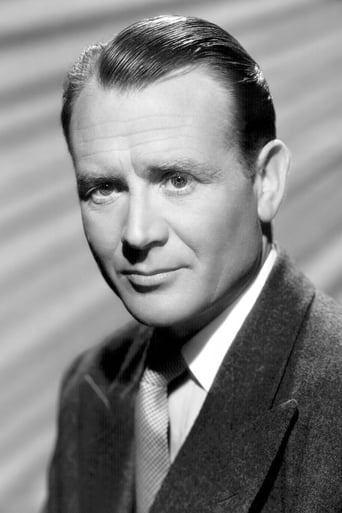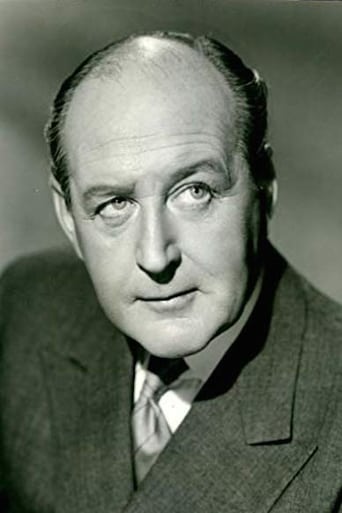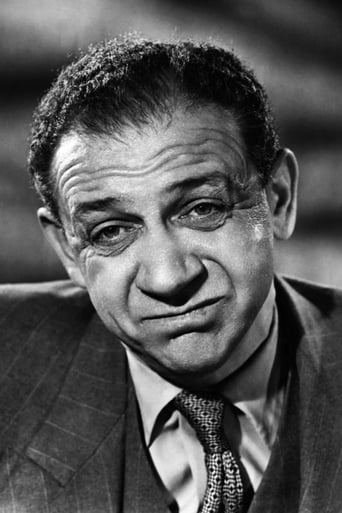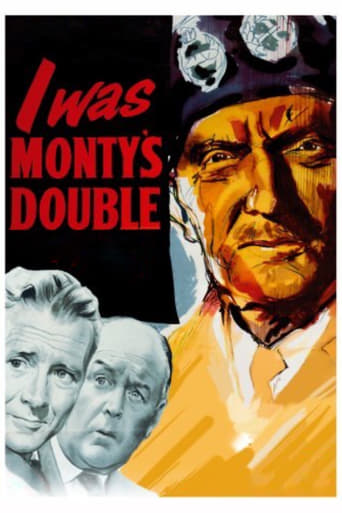
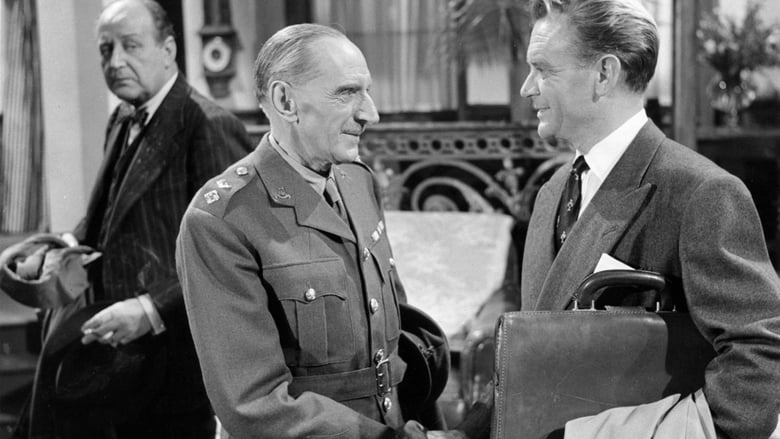
I Was Monty's Double (1958)
The incredible but true story of how an impersonator was recruited to impersonate General Montgomery to mislead the German's about his intentions before the North Africa campaign.
Watch Trailer
Cast
Reviews
Strong and Moving!
Fun premise, good actors, bad writing. This film seemed to have potential at the beginning but it quickly devolves into a trite action film. Ultimately it's very boring.
The movie's neither hopeful in contrived ways, nor hopeless in different contrived ways. Somehow it manages to be wonderful
It is an exhilarating, distressing, funny and profound film, with one of the more memorable film scores in years,
"I Was Monty's Double" dramatises a remarkable true story from World War II. M. E. Clifton James, a Lieutenant serving with the Royal Army Pay Corps (the British Army's financial department) and an actor in civilian life, was recruited by military intelligence to impersonate General Bernard Montgomery, to whom he bore a close resemblance. The reason was that the Allies were attempting to deceive the Germans by spreading false rumours that the D-Day landings would take place in the South of France rather than Normandy. To make such rumours credible it was essential that the Germans should be led to believe that Montgomery, Britain's leading General, was in North Africa, the obvious launch-pad for any such invasion. At the time it was essential that this scheme be kept secret, and Clifton James received no official recognition for his role. Ten years later, when the ban on public discussion of wartime operations had expired, he wrote an autobiography which revealed the story and became a best-seller. In the film he plays two roles- himself and Montgomery. This, unfortunately, means that one key scene, when Monty meets his double in order to encourage him, cannot be shown in the film. With modern computer trickery it would today be quite easy to have the same actor playing two different characters in the same scene, and even in 1958 it would probably have been technically possible. ("The Parent Trap", made by Disney only three years later, features several scenes in which Hayley Mills plays identical twin sisters and therefore appears to be in two places at once). Doubtless, however, the makers of a low-budget British film like this one did not have the same financial resources available to them as the Disney organisation. In real life Clifton James was discovered by the actor David Niven, who was serving as a British Army officer at the time, but he does not appear in the film and no mention is made of his role. (Perhaps the producers couldn't afford him- by 1958 he had become a major international star and doubtless could command large fees). Instead credit for the operation is given to two fictitious intelligence officers, Colonel Logan and Major Harvey, played by Cecil Parker and John Mills. Mills was a regular star of British war movies, generally playing officer types. "How-we-won-the-war" movies about true wartime episodes were a standard feature of the British cinema in the fifties, and varied greatly in quality. Most of these, however, featured combat operations of one type or another. "I Was Monty's Double" is a war film of a rather different type. Its one descent into standard heroics comes at the end, when Harvey has to foil an attempt by German commandos to kidnap Clifton James in the mistaken belief that he is the real Monty. (This is also the film's one major departure from historical facts. Although the Germans did have plans to assassinate Montgomery while he was in Alexandria, these were never put into effect). For most of its length the film's dramatic tension derives from Clifton James' own inner struggle to conquer his doubts and fears. Although he has little difficulty imitating Montgomery's voice and mannerisms, he finds it more of a struggle to convey the great man's personality. One particular difficulty he faces is that while he is both a heavy drinker and smoker, Montgomery was famously teetotal and a militant non-smoker, so he can never publicly be seen with a drink or a cigarette in his hand. It is strongly implied in the movie that Clifton James was not a great success as a theatre actor and spent most of his career as an understudy. This film, however, was to provide him with one great success near the end of his life. (He was to die five years later). If not quite in the class of something like "The Dambusters", it is one of the better "How-we-won-the-war" movies, and gives an insight into the work of the vital role of military intelligence, something often overlooked in the cinema. 7/10
This is a wonderful war film--mostly because it is NOT about fighting and shooting--we certainly have had a lot of that sort of film. I like films that show a different side--the seldom-known acts of heroism such as the film "Dam Busters" or "The Man Who Never Was". In "Hell, Heaven or Hoboken" (a badly renaming of "I Was Monty's Double"), you have the true story about a regular enlisted man and actor who was chosen to imitate General Montgomery--the leader of the British forces during WWII. The plan was to have the double go on a tour of North Africa around the same time as the Normandy invasion in Northern France--so that the Germans would assume the assault would come from the South as well as much later. This film is about the formation and execution of this ultra-top secret plan. It's filled with tension and is very, very watchable--much of it due to good writing, direction and excellent acting (it sure didn't hurt having John Mills and Cecil Parker along with the real-life double, M.E. Clifton-James in this leading role).I say watch this interesting film--it's a dandy. However, I did have one problem with the film--albeit a minor one and one more for history buffs like myself. The film used a lot of stock footage--most of it reasonably good. However, some of it was way too grainy and scratchy and made the film look cheap in spots--such as the footage of Bf-109s and Spitfires scrambling. Also, SOME of this real-life story is NOT real-life--such as the very exciting finale involving Nazi commandos! Still, a lovely little film and there's an awful lot to like!
"I Was Monty's Double" is based on the book of the same name, by M.E. Clifton James, an Australian actor in the service who is drafted to impersonate General Montgomery. Though some dramatic license is taken, what makes the film fun is that James plays himself and the historical events are true.In order to make the Nazis believe that D-Day is taking place in Gibraltor, James, who makes an appearance at the end of a show as Montgomery, is asked to impersonate the general. He bears a strong resemblance - so strong, in fact, that when he comes out onto the stage, he gets a standing ovation and rousing cheers. His recruiters, played by John Mills and Cecil Parker, are hoping the troops have the same reaction. They get him assigned as a driver so that he can observe Montgomery at close quarters and copy his mannerisms. James, however, finally tells Harvey and Logan (Mills and Parker) that he can't do it. He's never led a command. Logan is dumbstruck. "You won't be doing any actual commanding," he objects. A consummate actor, James replies, "You don't understand. I have to have it inside." However, he's so good that he is able to find the ego and leadership qualities internally to carry it off.The film is directed by John Guillerman with emphasis on the humor. Marius Goring plays a Nazi spy who thinks he's in tight with the Allies on Gibraltor. "We feed him all kinds of garbage," the top brass says. "He's faster than calling Berlin." The whole bit at the end is fiction, but it doesn't deter from a fascinating story. Highly recommended.
This is the somewhat true story of Lt. Clifton James who impersonated Gen. Bernard Montgomery at various Allied bases in order to mislead the Germans into thinking that the D-Day invasions would take place somewhere in the Mediterranean.James is pretty convincing too. If he's not a bravura actor, he is at least an actor, which he was in civilian life. He's ably assisted by John Mills, who guides him through his various performances on stage and off, and by Cecil Parker, who is more or less in charge of all the fakery.The British are extremely good at this kind of deceit. I mean, here they have the huevos to pass off some second-rate vaudevillian as a British field marshal and parade him around the high brass, both British and American, in Gibralter and North Africa. Then, too, there was "The Man Who Never Was," a carefully prepared scheme designed to persuade the Germans that the Allies would invade the Balkans rather than Sicily. Outrageous. I don't know who thought up putting General George Patton in charge of the fake FUSAG before Normany, with its inflatable rubber tanks and trucks and its wooden airplanes and concocted radio transmissions but I suspect that if Sherlock Holmes were to investigate he'd be able to sniff out the residual odor of fish and chips. Even during the Falkland Islands war, in 1982, just after the invasion by Argentine troops, the British were entirely candid about the ships and airplanes that were lost, but they'd immediately announced a blockade of the islands, maintained by British submarines -- that were not there. The lesson to be learned from these tricks is that the deceit must be plausible, infrequent, and strategic. Americans seem to do it differently. They lie recklessly. If an American sports figure dies in combat, he's given a decoration even if the death was the result of friendly fire. If a beautiful young woman is rescued from her Iraqi captors, she must have fought heroically and been abused before her salvation.Wait. Someone is flapping a napkin at me from the other end of the table. Let me get back to the movie.This is more of a comedy with some tense moments than it is a war-time drama. With Cecil Parker in a prominent role it could hardly be a heavy movie. Mills is his usual competent self, playing an officer with an eye for the girls. There's one scene that always cracks me up. A gorgeous blond secretary enters the room preceded by her bouncing breasts. She's holding a few pages in front of her. Mills' hand darts out towards her chest and just for a moment -- But, no. He grabs the sheets of paper and yanks them away. Nothing is made of it and the incident only last a second or two but it's emblematic of the movie.Except for the climactic scene in which German raiders capture James, still thinking he's Montgomery, and try to pirate him away from his seaside base until they are foiled by Mills wielding a single Sten gun. Man, that's not only improbable. It's practically impossible. And in fact it never happened.The direction is by John Guillerman, who has had his ups and his downs. One of his ups, in which I had the good fortune to appear, was the serene and majestic art house hit, "King Kong Lives." Here, sadly, his technique is pedestrian. Each important statement is filmed in close up. (That's so the statement's importance doesn't slip past you.) And some scenes are clumsily staged. However, I forgive him any of that because of the way he handled that breasts/papers incident.I don't know if I'd want to watch this too often. We all appreciate Clifton James and his accomplishments but he's not a strong figure and the responsibility of carrying the film is largely his, although the script sticks with Mills and Parker as much as it can.Still, enjoyable, exciting, and -- for some younger folk, I'm afraid -- highly educational.
